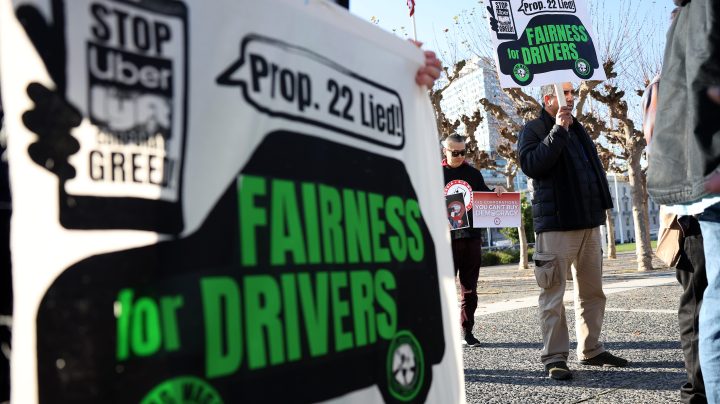
How ride-hail companies use data to pay drivers less

On-demand delivery and ride-hailing companies like Uber, Lyft and DoorDash have been campaigning for years for the legal right to treat their drivers as independent contractors rather than employees.
Last month, California’s Proposition 22 — which was the most expensive ballot campaign in the state’s history when it went to a public vote in 2020 — was upheld by a state appeals court. The law could have transformative effects on the growing gig economy.
One such effect that Prop. 22 enshrines is that ride-hail drivers are not entitled to a guaranteed minimum wage. Veena Dubal, a professor at the University of California College of the Law, San Francisco, conducted a study on how ride-hail drivers are compensated. She found that the companies use data they collect about drivers’ behavior to set personalized wages.
Dubal defines this method of compensation as “algorithmic wage discrimination.”
“If they were considered employees, this would likely be illegal,” Dubal said. “But they’re not. And so it’s just not protected.”
“Marketplace” host Kai Ryssdal spoke with Dubal about her study. The following is an edited transcript of their conversation.
Veena Dubal: What algorithmic wage discrimination does is use data that firms have on workers on their individual behavior, on their location. They use that data to determine how much they’re going to pay workers. And so you and I might be doing the exact same type of work the exact same way and at the exact same time, but we get vastly different wages from our employer or from the firm based on what the firm knows about us.
Kai Ryssdal: Explain to me how it works in real life, then give me an Uber driver, right? Because the company obviously has oodles of data not just on customers, but on the drivers.
Dubal: That’s exactly right. So here’s an example of someone from my research, who I call Diego. So, Diego was working in downtown Los Angeles during a really busy time period. And he was very close to getting a bonus, and that bonus was going to increase his hourly wage. And he just wasn’t getting a ride. And he said that he felt that the reason that he wasn’t getting a ride was because Uber knew that he was so close to his bonus and therefore was trying to keep him in the pool of drivers available. And what that did was make him work longer for less. So when he calculated his hourly wage, it was far lower than someone who was not as close to achieving their bonus.
Ryssdal: What does Uber have to say about this? And is this legal?
Dubal: Yeah, those are great questions. So, Uber embraces this. This is sort of their brave new world of work, and they call it dynamic pricing. They say that this is sort of how they are able to control drivers when they can’t because they consider the drivers to be independent contractors. It is legal to do this. It might violate the two existing systems of wage laws that we have: minimum wage and overtime laws, which say that workers are supposed to get a specific amount per hour. But Uber claims that these workers are independent businesspeople, and so minimum wage laws don’t apply to them. So if they were considered employees, this would likely be illegal, but they’re not. And so it’s sort of just not protected.
Ryssdal: Taking the flip side of the coin here for a minute, is it possible that employment law in this country is just old and has not caught up with the new realities of what companies know about how people are doing the work?
Dubal: Yeah, it’s a great question. I think that employment law in this country has developed according to individual needs. Minimum wage laws, so that you can have work and survive. Unemployment insurance, so if you’re laid off or deactivated, you can have something to help you as you look for other work. Workers’ compensation, so if you’re injured while you’re driving, you have some coverage. All of these laws were developed to support humans, to support people, and those basic human needs haven’t changed. So my answer would be no, that employment laws are not outdated, but that the rate of change in how firms have been able to avoid employment laws — primarily as a result of technological shifts — has led to a situation in which companies are able to evade enforcement.
There’s a lot happening in the world. Through it all, Marketplace is here for you.
You rely on Marketplace to break down the world’s events and tell you how it affects you in a fact-based, approachable way. We rely on your financial support to keep making that possible.
Your donation today powers the independent journalism that you rely on. For just $5/month, you can help sustain Marketplace so we can keep reporting on the things that matter to you.











